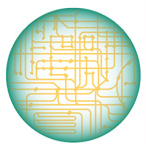Optimizing Enzymes for Plastic Upcycling using Machine Learning Design and High Throughput Experiments
Authors:
Benjamin Fram1,2* (fram@g.harvard.edu), Elizabeth Bell3, Gregg Beckham3, Richard Brizendine4, Karla Ilic Durdic4, Perry Ellis4, Japheth Gado3, Erika Erickson3, Samuel Lim2, Maria Llases3, Debora Marks2, Natasha Murphy3, Brenna Norton-Baker3, Nathan Rollins2, Chris Sander1,2, Nicole Thadani2, David Weitz4, Allison Werner3, Wentao Xu4, Xinge Zhang4, and Nicholas P. Gauthier1,2
Institutions:
1Dana-Farber Cancer Institute; 2Harvard Medical School; 3National Renewable Energy Laboratory; and 4Harvard University
Goals
This project aims to create new and optimized polyethylene terephthalate (PET)-depolymerizing enzymes (PETases) useful for industrial application. [Aim 1] Design novel PETases that are significantly different (25-65+ mutations) from known PET-depolymerizing enzymes and contain unique properties useful for performant enzymatic PET recycling and upcycling. Introducing many simultaneous mutations, while maintaining function, will enable researchers to more efficiently search for altered properties that depend on primary amino acid sequence. [Aim 2] Optimize previously described PETases by testing millions of mutagenized variants using directed evolution. Starting with existing functional PETases and exploring small changes in many distinct sequences using a novel ultra-HTP functional assay, researchers will optimize enzymes with improved properties by varying experimental conditions. [Aim 3] Characterize performance metrics of new and optimized PETases in detail including solvent tolerance, stability, catalytic rate, and substrate promiscuity.
Abstract
Plastic use is ubiquitous in the modern world, and PET is one of the most abundantly produced plastics (and the most highly produced polyester), with ~65 million metric tons manufactured annually. To the consumer, PET is likely most recognizable as the plastic used to make beverage bottles. Like many plastics, traditional mechanical or chemical means of PET deconstruction and upcycling are costly and inefficient.
Recently, biological enzymes capable of breaking down PET into its basic building blocks (terephthalic acid and ethylene glycol) have garnered significant attention as an attractive means of dealing with the plastic problem. These enzymes are currently undergoing pilot studies for implementation in enzyme-based recycling. However, there are significant limitations to current enzymes, including the need to perform costly pre-processing of the plastic waste before the enzymes are able to work. Further optimization of these enzymes is necessary to make the process profitable and thereby incentivize commercialization of this biology-based green recycling technology.
This project aims to apply recent advances in artificial intelligence and machine learning to design new versions of enzymes capable of breaking down PET. Based on preliminary experiments using this evolution-informed computational design strategy, researchers believe it is possible to create a highly diverse set of enzymes that have exceptional properties useful for industrial recycling. Testing these enzymes is typically labor intensive but using a new robotically enabled platform researchers will be able to experimentally characterize key enzymatic properties of thousands of these designed enzymes.
In addition to applying machine learning approaches to design new enzymes, the team has developed a novel method that, by experimentally testing millions of small changes to enzyme structure, enables optimization of existing enzymes that are known to break down plastic. The key to this approach is to encapsulate individual variations of each enzyme in single droplets together with plastic nanoparticles creating a mini reaction, and then select those droplets, which successfully break down PET to isolate the winning enzyme variants.
Ultimately, the result of these studies will be the discovery of highly optimized enzymes capable of breaking down PET plastics in an industrial recycling setting, enabling a powerful and green solution to the plastic problem.
Funding Information
This research was supported by the DOE Office of Science, Office of Biological and Environmental Research (BER), grant no. DE-SC0022024.
